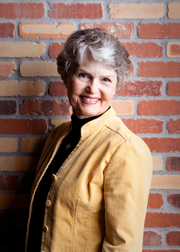In terms of a career, there are two sides to Laura Dene Low Card–the professorial side, Dr. Laura Card, who teaches English at BYU . . . and the authorial side, Dene Low, who has won multiple awards for her fiction:
- Edgar Award finalist (Mystery Writers of America) 2010
- Editor’s Choice of the Historical Novel Society, fall 2009
- Best of 2009, the Children’s Hour
- And a few more best of 2009 lists.
Not to discount her teaching, but we will be talking to Dene today.
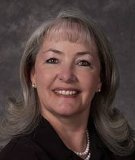 ME: You say that where you were born is irrelevant, but I find that most authors’ backgrounds have an effect on their writing in one way or another . . . so please tell us where you were born and raised–all the countries and states–and what your early childhood was like. (And I’d love a picture of you when you were young.)
ME: You say that where you were born is irrelevant, but I find that most authors’ backgrounds have an effect on their writing in one way or another . . . so please tell us where you were born and raised–all the countries and states–and what your early childhood was like. (And I’d love a picture of you when you were young.)
DENE: You are so right. Where I’ve lived plays a huge part in my writing. I’ve lived in 6 states and 2 other countries: Utah, Minnesota, California, Kentucky, Texas, and Colorado plus Germany and Austria. I use scenes and memories from those places—so far, mostly Colorado and California, but the others are definitely there to supply material for my writing.
(I knew it. And had I known in advance, I might have asked to see your kids in lederhosen.)
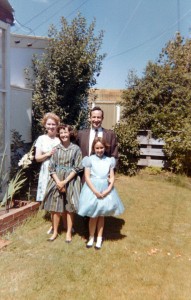 (Dene in the striped dress…I think…with her sister and parents)
(Dene in the striped dress…I think…with her sister and parents)
ME: Generally, all of that travel, both within and without the country, indicates a military background, but was it your father or your husband that took you to all those places, or both? (And a picture of you and your family abroad would be nice.)
DENE: My husband was an Army officer, so many of those places were lived in because of his career. However, my father was getting his education and Ph.D. and then got a job in California and then Utah, so he’s responsible for several moves.
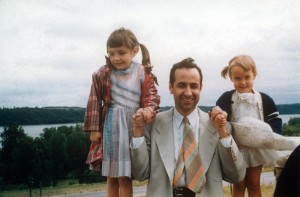 (Dene with her father and sister by the Mississippi River)
(Dene with her father and sister by the Mississippi River)
(Her three oldest children at home in Germany in 1978)
ME: I want to hear more about that mermaid book you tried to write in fourth grade. What was the basic plot and what stalled you in the first chapter?
DENE: That’s a funny one. There wasn’t much of a plot, which is why when I got to the end of the first chapter, I kind of gave up and decided to move on to loftier things, like taking swimming lessons (no doubt pretending to be a mermaid) and roaming the hills of California with the poison oak and blue belly lizards and my dog.
(Now I’m feeling a bit itchy.)
ME: Other than your sixth grade class newspaper, what do you consider your first success in publishing?
DENE: I remember the day I got the check from Cricket magazine for a short story I had revised and revised and then been told I had revised the good part out of and I probably couldn’t fix it. I had let it sit for months before deciding that they couldn’t tell me I couldn’t fix it, so I did. The note with the check just said, “Persistence pays.” I was ecstatic.
(Let that be a lesson to us all!)
ME: Where did you get your B.A., your M.A., and your Ph.D., and what is the greatest value of a master’s degree in creative writing, in your opinion? Also, how has being published affected your role as Dr. Card, the English professor?
DENE: BA—Brigham Young University. MA—Brigham Young University, PhD—University of Utah.
The value of a master’s degree in creative writing is that it makes you write to a deadline and then you get feedback. I remember taking the first 50 pages of my thesis in to a class and getting the response, “That’s very good.” I was shocked. I thought they ought to be jumping for joy and they didn’t. So, I threw away all 50 pages and started over. (I sense a perfectionist here.) The next time I brought it in, they were wowed and I was happy. I don’t think a creative writing master’s is necessary to be a good writer, but it is worthwhile if you want to develop discipline and to push yourself and to get feedback with your tuition.
ME: Please describe one of the most “unbelievable” experiences you’ve had in life.
DENE: OK, it’s a cliché, but having my babies was the most unbelievable—all six of them.
After that, I’d have to say the awards ceremony for the Edgar Award that I was a finalist for with PETRONELLA SAVES NEARLY EVERYONE. It was like the Academy Awards, just like you see on TV. Lots of fun and my agent treated me like I was gold that he didn’t want to let out of his sight. (I can imagine…he’d probably lost a client or two before by not keeping close enough tabs at such events.)
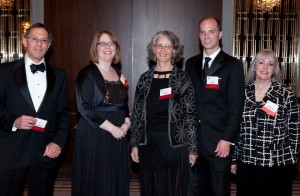 (Dene on the far right at the Edgar Awards…if you look really closely, you can see her agent peeking through the bars behind her)
(Dene on the far right at the Edgar Awards…if you look really closely, you can see her agent peeking through the bars behind her)
ME: Which book did you read as a child that cemented your goal of becoming an author one day, and why do you think it had that effect on you?
DENE: Probably King of the Wind, Little Women, Little Men, or Black Beauty or any of the many Nancy Drew mysteries…or any of the hundreds of other books that I read. (Okay, that’s really narrowing it down.)
I read nearly every book in our city library. They only let me take 5 at a time, which was discouraging, because I would finish them in a couple of days and not be able to get any more for another week. (Oh, so you’re the one that always had the book I wanted checked out…just kidding, I doubt we ever went to the same library.)
ME: Please tell us in detail about how your book, THE ENTOMOLOGICAL TALES OF AUGUSTUS T. PERCIVAL: PETRONELLA SAVES NEARLY EVERYONE, came to be published by Houghton Mifflin in 2009.
 DENE: The first time I sold the book was to an editor at a conference for one of the big New York publishers. (You see? Conferences work!)
DENE: The first time I sold the book was to an editor at a conference for one of the big New York publishers. (You see? Conferences work!)
We did two or three revisions and then she quit and disappeared and my book was an orphan. (But sometimes editors don’t.)
I was devastated and told Rick Walton about it and he told me to resubmit and gave me the names of 15 publishers and editors. (Okay, I want Rick Walton for my friend.)
I only had one respond. (But one is all you need if it’s the right one.)
Houghton Mifflin Harcourt editor Kate O’Sullivan had an assistant ask me for the full manuscript. (Yay!) I did another couple of revisions and then the assistant told me I could talk to Kate in person over the phone. (Even bigger “Yay!”) We worked on more revisions until the final copy. (Yes!)
Unfortunately, another book came out from HMH just a couple of months before mine with a protagonist with the same last name and time frame and setting and subplot (Okay, a minor setback), so I had to do some major rewriting and change all those things. It worked, but it was a lot of work.
(You see? Just like the guys at Cricket magazine said all those years ago, “Persistence pays.”)
ME: Why do you write in so many different genres (YA, Romance, Science Fiction, Fantasy, Historical Fiction, and Non-fiction), and do you plan on using pen names to avoid confusing your readers? What other books have you published and what stories do you have in the works? And how would you describe your writing process?
DENE: My brain clickety-clicks along with the speed of a bullet and I come up with all kinds of stories. I try to write a chapter for each idea so I have the idea cemented and then I put it away in a file on my computer to work on later. (Hmm…that’s an interesting approach. Might have to try that one.)
I’ve actually finished a few of those and they are now books. (By my count, which could be off, she has had about 15 books published now for both young and older readers. You can see the whole list on her website. I’ll post a few covers.)
On a daily basis, I get up very early, write for a few hours, take a nap, and then go to work as a writing professor. I try to gather material and do research later in the day when my brain isn’t as active so I have something to work on the next morning. To start writing in the morning, I read what I wrote or researched the previous day and that starts the juices flowing. I use a pen name now to separate my publishing career from my professorial career. I write my scholarly material using my first name and married name. The pen name is really my middle name and maiden name, which is fine, because my oldest friends don’t think of me as anything but Dene, pronounced deenee. So, my pen name is really my real name. Are you confused yet? (No, because I’ve had a week or so to wrap my head around it, but my readers might be. Just remember–Laura Card, professor…Dene Low, author.)
ME: Finally, while I know you love flying planes and riding your motorcycle (and I’d love a picture of that, please), I want to know where you really do most of your writing. Please describe your writing space in the voice of Petronella. (And I must have a picture.)
DENE: It is well known that some people are nest builders, while others are compulsively organized. I fall into the category of nest builder; in which category it is important to gather as much extraneous and useless stuff about one as possible in order to be comfortable. Also of importance is having said stuff within arm’s reach in case one should find a possible use for anything that might come to mind, be it a bit that has recently been added to the pile or something more anciently placed there. Extraneous and useless stuff in the form of a nest is necessary for creativity to take place as well as to keep unwanted visitors from finding their way into the place of writing and to discourage them from settling in and staying an unwelcome amount of time. In other words, mess is safety and privacy as well as comfort.
(And that is no doubt why she didn’t send me a picture of her nest…I mean, writing space. I think she gave us all a pretty clear visual, however.)
If you want to know more about Dene and her writing, check out her website and her blog.
Next Wednesday, I’ll be talking with Fay Klingler, author of several works of what I like to call “Women’s Non-fiction.”
Originally posted 2013-06-26 15:10:51.






